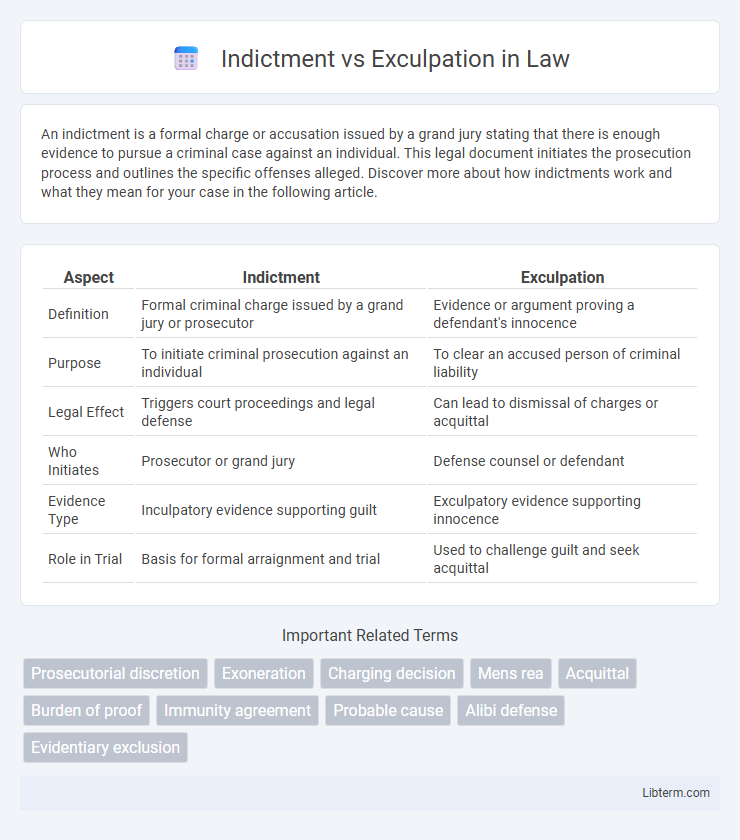An indictment is a formal charge or accusation issued by a grand jury stating that there is enough evidence to pursue a criminal case against an individual. This legal document initiates the prosecution process and outlines the specific offenses alleged. Discover more about how indictments work and what they mean for your case in the following article.
Table of Comparison
| Aspect | Indictment | Exculpation |
|---|---|---|
| Definition | Formal criminal charge issued by a grand jury or prosecutor | Evidence or argument proving a defendant's innocence |
| Purpose | To initiate criminal prosecution against an individual | To clear an accused person of criminal liability |
| Legal Effect | Triggers court proceedings and legal defense | Can lead to dismissal of charges or acquittal |
| Who Initiates | Prosecutor or grand jury | Defense counsel or defendant |
| Evidence Type | Inculpatory evidence supporting guilt | Exculpatory evidence supporting innocence |
| Role in Trial | Basis for formal arraignment and trial | Used to challenge guilt and seek acquittal |
Understanding Indictment: Definition and Legal Basis
Indictment is a formal legal accusation issued by a grand jury or prosecutor, alleging that an individual has committed a criminal offense based on probable cause. It serves as the foundational step in criminal proceedings, ensuring that charges are supported by sufficient evidence before a trial. Legal statutes and judicial precedents define the procedural requirements and scope of indictments to protect defendants' rights while facilitating the administration of justice.
What is Exculpation? Key Concepts Explained
Exculpation refers to the legal process or evidence that clears an individual from blame or fault in a criminal or civil case. Key concepts of exculpation include proving innocence, refuting accusations, and providing alibis or corroborative evidence that negates charges or allegations. Unlike indictment, which formally accuses a person of a crime, exculpation emphasizes justification or proof of non-involvement in the alleged wrongdoing.
The Indictment Process: How Charges Are Filed
The indictment process begins when a prosecutor presents evidence to a grand jury, which determines whether probable cause exists to formally charge a suspect with a crime. If the grand jury finds sufficient evidence, it issues an indictment, initiating criminal proceedings and specifying the charges against the defendant. This formal accusation contrasts with exculpation, which involves presenting evidence to clear a suspect of wrongdoing and prevent charges from being filed.
Grounds for Exculpation: Legal Defenses and Justifications
Grounds for exculpation in criminal law include legal defenses such as self-defense, insanity, and duress, which justify or excuse otherwise criminal conduct. These defenses negate criminal liability by proving lack of intent, absence of mens rea, or lawful justification for the defendant's actions. Courts evaluate evidence and circumstances to determine whether exculpatory factors sufficiently undermine the prosecution's case following an indictment.
Indictment vs Exculpation: Core Differences
Indictment refers to the formal charge or accusation that a person has committed a crime, often initiated by a grand jury or prosecutor. Exculpation involves evidence or arguments that clear an individual of guilt, demonstrating their innocence or lack of involvement in the alleged offense. The core difference lies in indictment asserting criminal suspicion, while exculpation seeks to remove blame or legal responsibility.
Legal Implications of Indictment and Exculpation
Indictment formally charges an individual with a crime, initiating criminal prosecution and potentially leading to arrest, trial, and conviction, which significantly impacts the accused's legal status and rights. Exculpation involves presenting evidence or arguments that clear the accused of guilt, thereby preventing conviction and restoring their legal standing. Understanding the legal implications of indictment and exculpation is crucial for navigating criminal justice processes and safeguarding defendants' rights.
The Role of Evidence in Indictment and Exculpation
Evidence serves as the cornerstone in both indictment and exculpation processes, establishing the foundation for legal decisions. In indictment, prosecutors rely on substantial, credible evidence that demonstrates probable cause to charge an individual with a crime. Conversely, exculpation hinges on evidence that negates guilt, providing proof that supports the defendant's innocence or challenges the prosecution's claims.
Rights of the Accused: From Indictment to Exculpation
The rights of the accused are crucial throughout the legal process, beginning with the indictment that formally charges them with a crime, ensuring they are informed of the accusations to prepare a defense. During exculpation, the burden of proof shifts as the accused presents evidence or arguments to demonstrate innocence or lack of culpability, safeguarding the presumption of innocence. Legal protections such as the right to counsel, the right to a fair trial, and protection against self-incrimination are fundamental from indictment through exculpation to uphold justice and prevent wrongful convictions.
Case Studies: Notable Examples of Indictment and Exculpation
The indictment of former Enron executives in 2001 highlighted corporate fraud and led to significant legal reforms, while exculpation examples include the 1995 O.J. Simpson trial where acquittal demonstrated the complexities of criminal defense and reasonable doubt. Another notable case is the indictment of the Watergate scandal figures in the 1970s, which resulted in multiple convictions and President Nixon's resignation, contrasting with the exculpation of Amanda Knox in 2015 when new forensic evidence overturned her murder convictions. These case studies emphasize the critical role of evidence evaluation and legal strategy in differentiating between culpability and innocence.
Navigating the Legal System: Seeking Indictment or Exculpation
Navigating the legal system requires understanding the crucial distinction between indictment and exculpation, where an indictment formally charges an individual with a crime based on probable cause, while exculpation involves presenting evidence to prove innocence or remove blame. Legal professionals must strategically seek indictment when initiating prosecution and pursue exculpation through rigorous defense to safeguard clients' rights and achieve just outcomes. Mastery of procedural rules and evidentiary standards is essential for effectively managing cases within criminal justice frameworks.
Indictment Infographic

 libterm.com
libterm.com